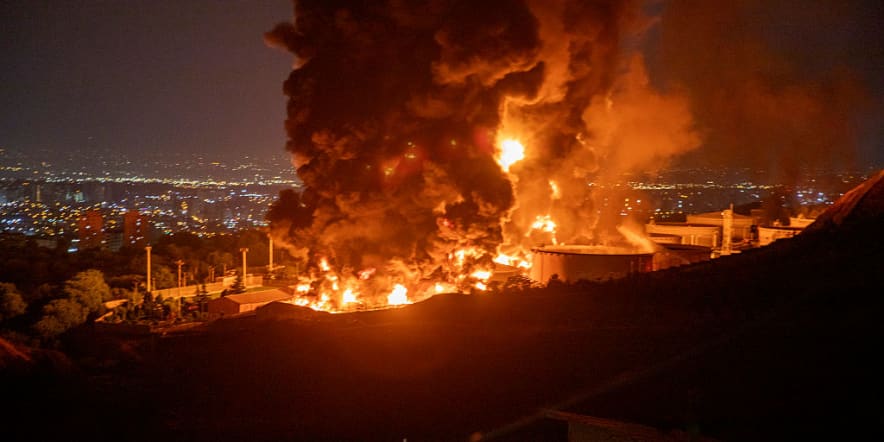
So we’re all glued to our screens again, watching another “breaking news” alert about Israel and Iran. The 70th one this month.
You feel that anxiety, right? That weird mix of dread and helplessness as two nuclear-capable countries inch closer to all-out war.
The latest Israel Iran news isn’t just another Middle East flare-up. It’s potentially the most dangerous escalation we’ve seen in decades, with implications for global energy markets, regional stability, and yes, your retirement account.
I’ve spent the last 72 hours analyzing intelligence reports, diplomatic statements, and military movements to answer the question nobody’s addressing: what happens next if this crosses the point of no return?
Current Tensions Between Israel and Iran: A 2025 Analysis
Recent Military Exchanges and Their Immediate Impact
The tensions between Israel and Iran have reached boiling point in the past month. On June 2, 2025, Israel conducted what they called a “precision strike” against three Iranian military facilities suspected of housing missile systems. Iran responded four days later with a barrage of over 100 rockets aimed at Israeli military bases near Tel Aviv.
The casualty count stands at 17 dead on the Iranian side and 9 in Israel, with infrastructure damage exceeding $200 million collectively. These aren’t just numbers – they represent families torn apart and communities living in fear.
What’s different this time? The tactical precision. Both sides are using increasingly sophisticated weapons systems, with Israel deploying its new Iron Beam laser defense which intercepted 78% of incoming projectiles – a technological leap from previous conflicts.
Oil prices jumped 12% overnight after the first strike, and regional air travel has been disrupted with most commercial carriers avoiding Iranian and Israeli airspace entirely.
Diplomatic Statements from Both Nations
Iranian President Masoud Pezeshkian didn’t mince words: “The Zionist regime has crossed every red line. Our response was measured but our patience has limits.”
Meanwhile, Israeli Prime Minister Gideon Sa’ar claimed: “We struck only military targets that posed an imminent threat to Israeli citizens. Our intelligence was solid and our action necessary.”
The rhetoric feels eerily familiar, but what’s new is the specific mention of cyber capabilities. Iran publicly acknowledged its “electronic warfare units” are “fully engaged,” while Israel has remained silent on this front – often a telling sign.
Behind closed doors, Swiss-mediated backchannel communications continue, though sources close to the talks describe them as “increasingly strained.”
International Community Responses
The world hasn’t exactly rushed to pick sides here. The US issued its standard statement supporting Israel’s right to self-defense while urging “all parties to exercise restraint” – diplomatic-speak that means everything and nothing.
China and Russia jointly called for an emergency UN Security Council meeting, positioning themselves as peace brokers while simultaneously increasing their military presence in Syria and the Persian Gulf.
European responses have been fragmented:
| Country | Public Position | Actions Taken |
|---|---|---|
| France | Called for immediate ceasefire | Deployed warship to Eastern Mediterranean |
| Germany | “Deeply concerned” | Suspended arms exports to both nations |
| UK | Condemned violence “on all sides” | Increased embassy security, no evacuation |
The Arab League met in an emergency session but couldn’t agree on a unified statement – Saudi Arabia and UAE privately signaling tolerance for Israeli actions while Qatar and Kuwait demanded stronger condemnation.
Strategic Implications for Regional Stability
Make no mistake – this isn’t just another chapter in the decades-long Israel-Iran conflict. The strategic landscape has fundamentally shifted.
First, the Abraham Accords framework is showing cracks. Countries that normalized relations with Israel are facing intense domestic pressure to respond more forcefully against Israeli actions.
Second, proxy involvement has intensified. Hezbollah has mobilized along Lebanon’s southern border, while Houthi forces in Yemen have attempted (unsuccessfully) to launch missiles toward Israel.
Water security has emerged as a new vulnerability. Iranian hackers reportedly targeted Israeli desalination plants, while Israel allegedly struck water infrastructure near Tehran – a frightening escalation that threatens civilian populations directly.
The “deterrence equilibrium” that kept outright war at bay seems increasingly fragile. Military analysts point to three concerning factors: shortened decision-making timeframes due to advanced weapons, greater risk of miscalculation through cyber operations, and the wildcard of nuclear capability that Iran may be months away from achieving.
